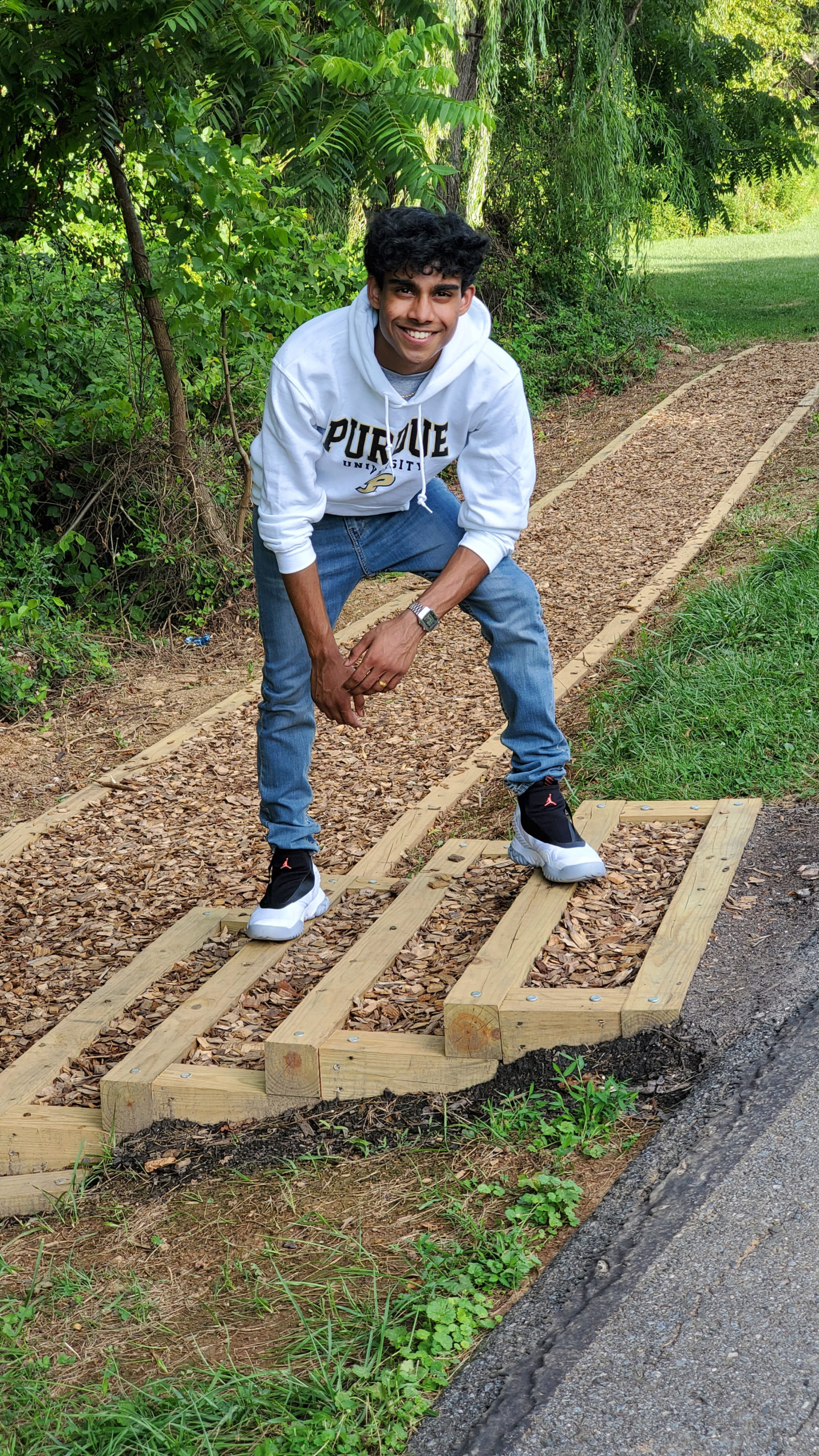 As someone who has always had a soft spot for community service and a passion for engineering, I felt that my Eagle Project was a perfect opportunity for me to make a meaningful impact in my community while also developing personal skills and knowledge. For my project, I built a new path alongside a hill in my community, but it involves the risk of skidding and falling down the hill into shrubs while walking tangent to such a steep slope. My goal was to fix this issue and create a more convenient and safer path for everyone.
As someone who has always had a soft spot for community service and a passion for engineering, I felt that my Eagle Project was a perfect opportunity for me to make a meaningful impact in my community while also developing personal skills and knowledge. For my project, I built a new path alongside a hill in my community, but it involves the risk of skidding and falling down the hill into shrubs while walking tangent to such a steep slope. My goal was to fix this issue and create a more convenient and safer path for everyone.
After I had submitted my proposal and done all the necessary planning, when I was about to begin my project, the COVID-19 pandemic began. For months, BSA had also shut down, and I had little to no communication with anyone who knew what I should do. Because of COVID-19, my project was already on a limited schedule. Moreover, the pandemic forced many lumber mills to shut down, thus creating a shortage in the availability of wood and rental trucks in all local stores such as Home Depot and Lowes.
Ultimately, I had to drive half an hour to Aspen Hill to rent out a truck and drive that truck for an hour to Chantilly, Virginia – the nearest place where I found a store that had the wood I needed in stock. The wood was being sold out so quickly that I became worried if it would still be in stock when I reached the store after the long commute. Furthermore, it was also tough to find wood chips. Local retailers either sold them in small bags or in mass quantities, which were too much for what I needed. Other companies didn’t offer shipping, and even those that did only would deliver in dump trucks instead of prepackaged bags, as I preferred.
But once I had received the wood chips, the project was back on track. Although we still had to be careful while doing this project due to COVID-19 and the summer heat. Since the nearest parking lot from the worksite was atop a steep hill, it was too strenuous and dangerous to transport all the wood chips from the place where the wood chips were dumped down the hill to the worksite. On top of this, there was a 107-degree heat index reading, which put everyone at risk for heat strokes and dehydration. Frequent breaks were necessary as everyone was exhausted and out of breath since breathing was limited through masks, and shade was scarce. This limited the amount of work that could be accomplished per day, and the project was ultimately extended into a third day. Lastly, the inherent risk of COVID-19 was another major issue related to the project, and several precautions were put in place to mitigate this.
Apart from these major issues, I also had some technical issues regarding the project. I had to make sure that the rebars and spikes I hammer into the ground don’t hit the utility lines directly underneath. Hammering in rebars was also incredibly difficult. Due to the rocky soil, the rebars would sometimes hit a stone a foot underground and not go down any further. This made it very hard, and time-consuming to get rebars into the ground and ultimately led to last-minute shopping runs to buy smaller sized rebars and spikes, costing us more time. Despite all of that, we finished the project. The primary process of the project started with clearing out shrubs. Then we dug out part of the hill to make stairs, leveled the area at the foot of the hill to create a path, and edged the path and stairs with woodblocks. Finally, we laid weed blocking fabric, connecting the stairs to the path, nailed down the wood with spikes (while making sure the spikes don’t hit any utility lines), and finally covered the path in wood chips.
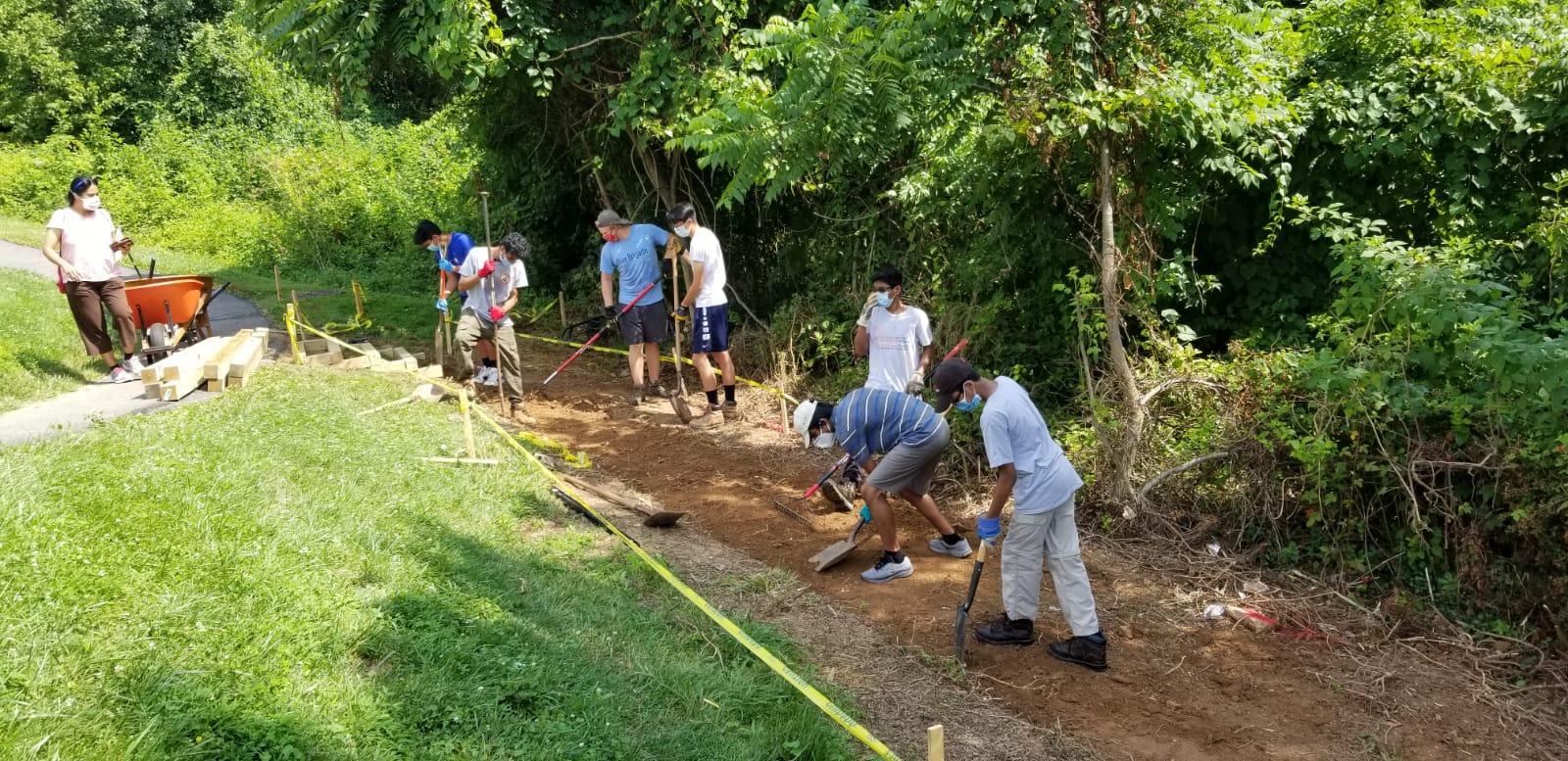 My favorite part of this project is that it is related to my passion for engineering. I learned so much about leading a team under pressure and gaining experience designing and executing engineering plans. It was also humbling to see so many volunteers willing to donate tools or come and help out. Companies like Ace Hardware, which donated tools for my project, Mainscapes, donated, and delivered all the woodchips I needed. Many of my friends who volunteered in the project (some of whom were not even Boy Scouts themselves) were essential to my project’s success. Moreover, one of the workdays was during my 18th birthday, and it was very satisfying to spend the day that marked my adulthood, giving back to my community that made me who I am. This project taught me a lot about planning, delegating duties to people based on their strengths, learning to accept the unexpected, and understanding that you can’t be prepared for everything; impulse decisions under pressure will always be needed. I also learned to think and work like an engineer, worry about how the structure will hold up in various weather conditions, react to wear and tear, and understand the importance of adhering to all safety regulations for any construction.
My favorite part of this project is that it is related to my passion for engineering. I learned so much about leading a team under pressure and gaining experience designing and executing engineering plans. It was also humbling to see so many volunteers willing to donate tools or come and help out. Companies like Ace Hardware, which donated tools for my project, Mainscapes, donated, and delivered all the woodchips I needed. Many of my friends who volunteered in the project (some of whom were not even Boy Scouts themselves) were essential to my project’s success. Moreover, one of the workdays was during my 18th birthday, and it was very satisfying to spend the day that marked my adulthood, giving back to my community that made me who I am. This project taught me a lot about planning, delegating duties to people based on their strengths, learning to accept the unexpected, and understanding that you can’t be prepared for everything; impulse decisions under pressure will always be needed. I also learned to think and work like an engineer, worry about how the structure will hold up in various weather conditions, react to wear and tear, and understand the importance of adhering to all safety regulations for any construction.

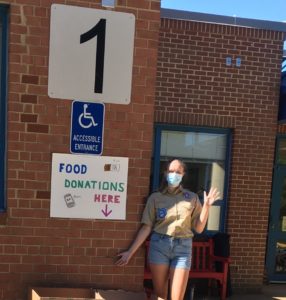 “Recognizing limited time for me to accomplish my goals, I worked fast to get organized. I was excited to learn more about leadership and to advance in ranks like my brother did,” said Bazemore. Joining Troop 1533G in 2019 not only built Bazemore’s skills in leadership, but also her confidence. “The fact that you interview with adult members of the troop when advancing ranks or earning merit badges really helps to build some confidence as you share what you’ve learned. While each step can feel a little intimidating, you keep going, and it gets easier the more you practice.”
“Recognizing limited time for me to accomplish my goals, I worked fast to get organized. I was excited to learn more about leadership and to advance in ranks like my brother did,” said Bazemore. Joining Troop 1533G in 2019 not only built Bazemore’s skills in leadership, but also her confidence. “The fact that you interview with adult members of the troop when advancing ranks or earning merit badges really helps to build some confidence as you share what you’ve learned. While each step can feel a little intimidating, you keep going, and it gets easier the more you practice.” To earn her Eagle Scout Award, Bazemore must hold leadership positions in her troop, earn 21 merit badges focusing on important life skills such as first aid, camping, and personal finance, and lead a service project in her community. For her Eagle project, Bazemore organized volunteers from her troop to make snuffle mats and blankets for a local animal shelter, the Animal Welfare League of Alexandria. The shelter staff requested the snuffle mats because they stimulate dogs’ brains and encourage slower eating habits. She raised money to purchase the supplies and also collected material donations, like dog and cat food, from her troop. As a result of the pandemic, she had to accomplish all of this digitally to maintain social distancing. “Thankfully, it was fairly easy to transition the demonstration of how to make the blankets and snuffle mats online. Although I am not set on a specific career path yet, I am very interested in veterinary medicine, so I wanted to do a project I was both interested in and could tie into my love for animals.”
To earn her Eagle Scout Award, Bazemore must hold leadership positions in her troop, earn 21 merit badges focusing on important life skills such as first aid, camping, and personal finance, and lead a service project in her community. For her Eagle project, Bazemore organized volunteers from her troop to make snuffle mats and blankets for a local animal shelter, the Animal Welfare League of Alexandria. The shelter staff requested the snuffle mats because they stimulate dogs’ brains and encourage slower eating habits. She raised money to purchase the supplies and also collected material donations, like dog and cat food, from her troop. As a result of the pandemic, she had to accomplish all of this digitally to maintain social distancing. “Thankfully, it was fairly easy to transition the demonstration of how to make the blankets and snuffle mats online. Although I am not set on a specific career path yet, I am very interested in veterinary medicine, so I wanted to do a project I was both interested in and could tie into my love for animals.”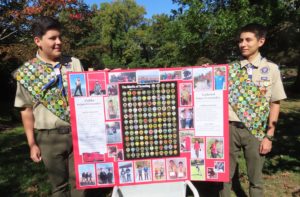 Pablo and Gabriel Sejas-Fernandez, brothers and Eagle Scouts in Troop 1131, have earned all 137 merit badge currently offered by the Boy Scouts of America (BSA), an accomplishment achieved by only about 450 scouts in the 110-year history of the Boy Scouts. Troop 1131 is sponsored by St. Stephen’s United Methodist Church, in Burke, Virginia, and is part of the Patriot District of the National Capital Area Council, BSA. The boys’ inspiration to earn all the merit badges came early in their Scouting career when Pablo and Gabriel learned about an older Scout who had accomplished the feat. So, after several years of hard work, Pablo and Gabriel accomplished their goal. A small ceremony to celebrate their achievement was held on October 18, 2020, when they received the last merit badge they needed, Backpacking.
Pablo and Gabriel Sejas-Fernandez, brothers and Eagle Scouts in Troop 1131, have earned all 137 merit badge currently offered by the Boy Scouts of America (BSA), an accomplishment achieved by only about 450 scouts in the 110-year history of the Boy Scouts. Troop 1131 is sponsored by St. Stephen’s United Methodist Church, in Burke, Virginia, and is part of the Patriot District of the National Capital Area Council, BSA. The boys’ inspiration to earn all the merit badges came early in their Scouting career when Pablo and Gabriel learned about an older Scout who had accomplished the feat. So, after several years of hard work, Pablo and Gabriel accomplished their goal. A small ceremony to celebrate their achievement was held on October 18, 2020, when they received the last merit badge they needed, Backpacking.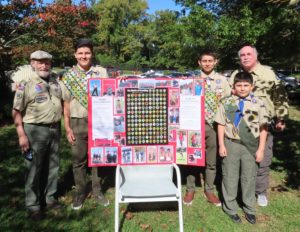
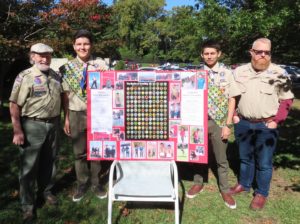
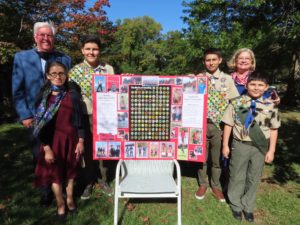
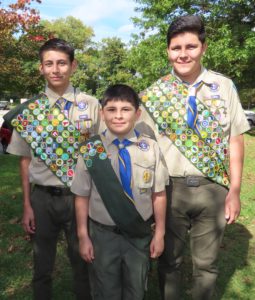 Gabriel Sejas-Fernandez is a Sophomore at Lake Braddock H.S. Gabriel earned the Arrow of Light as a Cub Scout and bridged over to Boy Scouts in September 2016. He earned the rank of Eagle Scout on October 18, 2020, at the same time he earned the last merit badge he needed, Backpacking. His Eagle Scout project was a landscaping project similar to Pablo’s. He cleaned up and removed abundant weeds and overgrowth. The planted 80 individual native Virginia species alongside the newly paved sidewalk at Hidden Oaks Nature Center, in Annandale, Virginia. Gabriel’s leadership positions have included Assistant Senior Patrol Leader, Patrol Leader, Troop Guide, and Bugler. Gabriel earned the Servus Dei Award in 2018, Service to Youth Award in 2019, and the Ad Altare Dei Award in 2020. He also has over 150 days camping, earning the Alben Struble Award for Perfect Camping in 2017 as a member of his earlier Troop 61. He also has over 140 miles backpacking and hiking. Gabriel attended the National Order of the Arrow Conference in 2018, and the 2019 World Scout Jamboree Jamboree at the Summit in West Virginia.
Gabriel Sejas-Fernandez is a Sophomore at Lake Braddock H.S. Gabriel earned the Arrow of Light as a Cub Scout and bridged over to Boy Scouts in September 2016. He earned the rank of Eagle Scout on October 18, 2020, at the same time he earned the last merit badge he needed, Backpacking. His Eagle Scout project was a landscaping project similar to Pablo’s. He cleaned up and removed abundant weeds and overgrowth. The planted 80 individual native Virginia species alongside the newly paved sidewalk at Hidden Oaks Nature Center, in Annandale, Virginia. Gabriel’s leadership positions have included Assistant Senior Patrol Leader, Patrol Leader, Troop Guide, and Bugler. Gabriel earned the Servus Dei Award in 2018, Service to Youth Award in 2019, and the Ad Altare Dei Award in 2020. He also has over 150 days camping, earning the Alben Struble Award for Perfect Camping in 2017 as a member of his earlier Troop 61. He also has over 140 miles backpacking and hiking. Gabriel attended the National Order of the Arrow Conference in 2018, and the 2019 World Scout Jamboree Jamboree at the Summit in West Virginia.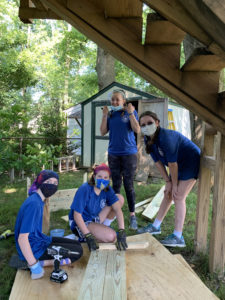 When I learned that Bailey’s Elementary School in Vienna, VA, needed some garden boxes, I was inspired to help. I’ve always liked the school as my mother works there, and I particularly enjoy the idea of garden boxes that would help kids learn more about nature. So I decided to reach out to the school and present my plan for my Eagle Scout Service Project.
When I learned that Bailey’s Elementary School in Vienna, VA, needed some garden boxes, I was inspired to help. I’ve always liked the school as my mother works there, and I particularly enjoy the idea of garden boxes that would help kids learn more about nature. So I decided to reach out to the school and present my plan for my Eagle Scout Service Project.